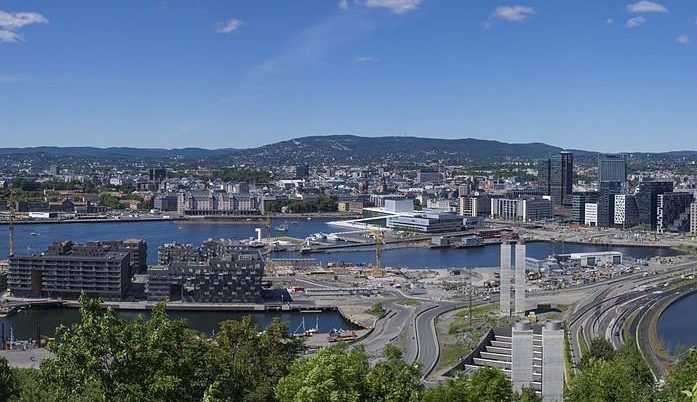Is Oslo the world’s most complete maritime cluster?

Chief correspondent Jason Jiang runs the rule over the Norwegian capital as Nor-Shipping comes to a close.
Oslo has been a major shipping and maritime centre since the earliest days of its existence. Nowadays it has been developed into one of the leading maritime capitals in the world, competing with Singapore, Hamburg, Shanghai and London. The city is home to a large number of major maritime-related companies including shipowners, shipbrokers, maritime insurers and ship financing firms and ship classification society. The cover star of the current issue of sister title Maritime CEO magazine, Lars Kristoffersen from Torvald Klaveness, believes the Norwegian capital is the most complete maritime cluster in the world. Is this possible?
In Menon Economics’ latest Leading Maritime Capitals Report, Oslo emerged as the third leading maritime city globally after Singapore and Hamburg. The city ranked top in maritime technology ahead of Singapore, Tokyo, Shanghai and Busan, and ranked second in finance & law, and attractiveness & competitiveness. Oslo has also been ranked second most innovative & entrepreneurial maritime city.
Christian Mellbye, senior analyst at Menon Economics would rather consider the whole Norwegian cluster is the most complete maritime cluster in the world, as in the Oslo region, there is only one major shipyard Vard Breivik, and the vast majority of shipbuilding is found on the west coast of Norway.
According to Mellbye, shipping companies in Oslo are focusing more on finance and Bergen is still the main area for industrial shipping operations.
“However, Oslo is still a complete shipping cluster, with shipowners and all relevant services connected to it, for example finance, law, insurance, brokering and classification,” Mellbye says.
The Menon report points out that the digitization is likely to disrupt the maritime industry in the coming years and Oslo is best prepared for the digital transformation of the industry, however, Oslo may face competition from Copenhagen in this regard.
“The world isn’t standing still, and shipping can’t afford to. There’s no doubt that digital technology will be at the heart of the next generation of shipping solutions. Here the Nordic countries have taken a clear lead, ” says Birgit Liodden, director of Nor-Shipping.
Norwegian owners control the world’s sixth most valuable fleet. Being the centre for maritime finance and law in Norway, Oslo is the natural center for shipowners from other parts of Norway and internationally to meet.
While Oslo has the highest number of shipping companies with headquarters in the city-region, it is surpassed by Athens, Copenhagen and London when looking at the market value of these companies.
“It is not necessarily the number of ships that says something of a city’s status as a maritime capital, it’s maybe more important to look at where real decision makers can be found. Hamburg and Oslo are two very different cities when looking at this dimension,” says Kristin Holth, head of the shipping, offshore and logistics division at DNB, an important name in ship finance.
During the last decades, much of the technical operations have moved away from the city, steering the city into a more financial-based shipping and commercial operations.
When it comes to the shipping finance sector, Oslo is home to the world’s two leading shipping banks, and also has a strong position with a maritime focused stock exchange and leading insurance and brokering entities.
According to Mellbye, Oslo’s strong position in maritime finance is mainly due to Norway’s strong historical position in the maritime industry and the development of world leading financial services that have supported this industry.
However, Oslo’s weakness is the high cost of these high-end maritime products and solutions and insignificant port activity. For several years, Oslo has been listed as one of the most expensive cities in the world.
Olav Akselsen, director general of shipping and navigation with the Norwegian Maritime Authority, agrees with Mellbye’s view. “We do not regard Oslo as a separate maritime cluster, but rather Norway as complete maritime cluster with Oslo as the main financial hub,” Akselsen says, adding that Oslo also lacks R&D facilities.
Akselsen reckons Norway’s maritime cluster is strongly positioned as the most complete in the world.
According to Akselsen, Norway’s offshore industry facilities and yards are on the west coast, R&D in central Norway, and Oslo as a financial and managerial hub make the most of the country’s maritime history and proximity to the sea.
“Our foremost quality is a strong drive to innovate and develop the shipping industry and make Norwegian innovation the world standard. This is evident in new developments in alternative fuels, autonomous ships and digitization of the industry,” Akselsen says.
“A well functioning cluster also factors in the regulatory authorities, and we intend the Norwegian Maritime Authority to contribute by developing regulations in step with the industry and acting as a door-opener to international bodies such as the IMO,” Akselsen concludes.

Not all information is created equal. As our research professors stressed “just because its published doesn’t make it accurate.”Critical evaluation of the information. Each assertion, claim or projection needs to be evaluated to determine the quality and credibility of the research. 2000 questionaires sent out to “experts” “on every contintent” 1740 didn’t bother to respond. 260 experts “responded.” “The cluster geography was determined by a two hour drive from the cluster center.” In a slow car at rush hour? For goodness sakes we’re in the 21st century redefine the aspects of connected clusters. Transparency was big at NorShipping let Menon and DNVGL post a full disclosure: expert list, who paid for the study, business with evaluated organizations would be a good start. Who on Antarctica got a questionaire? You want to accurately predict the future take a page from Elon Musk and build it.